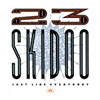 A reissue of a reissue, this newest version of the band’s original singles collection couples most of the tracks from the original vinyl issue, as well as the separate Just Like Everybody Part Two from the late 1980s to create a definitive anthology of material. Along with the two other reissues by LTM, this not only presents the classic material, but also most of the tracks from the previous The Gospel Comes to New Guinea compilation (the remainder of witch are scattered on the other releases). Such a sprawling track list is good in some ways, but in others feels a bit too long.
A reissue of a reissue, this newest version of the band’s original singles collection couples most of the tracks from the original vinyl issue, as well as the separate Just Like Everybody Part Two from the late 1980s to create a definitive anthology of material. Along with the two other reissues by LTM, this not only presents the classic material, but also most of the tracks from the previous The Gospel Comes to New Guinea compilation (the remainder of witch are scattered on the other releases). Such a sprawling track list is good in some ways, but in others feels a bit too long.
Disc one comprises the classic material, and from the first synth noises, ring modulated/spring reverbed drums and sneered vocals of "Kundalini" (produced by Genesis P-Orridge and Peter Christopherson), it’s easy to hear the parallels of contemporaneous Cabaret Voltaire, but with a more notable ethnic and tribal bent. This is unsurprisingly even more obvious in the Stephen Mallinder produced "Last Words" which, on the 12" mix here, links a tribal percussion piece with a sharp disco beat and dubby production elements, and later a chaotic bit of noise. This same beat pops up again on "Assassin (Shugyosha Step)," though in a more processed, delay heavy instrumental mix.
Of course the classic "Coup" appears here in its original JLE Mix form, and it remains the funk behemoth of horns and jazz elements, looped Apocalypse Now samples, and the bass line that the Chemical Brothers borrowed that has a timeless James Brown meets proto-industrial vibe that could never quite be matched. "Vegas El Bandito" and "IY" both slap together tribal beats, funk influenced guitar and dubbed out bass into a compelling mix.
The Turnbull brothers’ love of martial arts and Asian ethnic music is clearest on "Language (12" Dub)" and "Kongo Do," the former being all percussion with Indonesian gamelan elements, while the latter uses traditional Japanese instrumentation in an untraditional song structure. "Ooze" however is a track that now sounds a bit dated (compared to the other pieces) with its traditional 1980s hip-hop beats, orchestra hits, and turntable scratches, putting it right next to Grandmaster Flash and Herbie Hancock’s "Rock It" in execution. Originally released in 1986, it was cutting edge at the time, but 20+ years later, it feels too traditional. Unfortunately, this is a definite precursor for what is to follow.
The second disc, originally issued as Just Like Everybody Part Two, compiles tracks issued as singles and EPs throughout the late 1980s and 90s that unfortunately don’t show the band as confrontational or groundbreaking as they previously were. Instead, they took their early flirtations with hip-hop to the next level and released a series of instrumental tracks, mostly built on a framework of rap percussion, but with the overreaching sonic textures being less unconventional and safer. “Roninstep” is a perfect example of this: traditional rap beats and vocal samples that are almost TOO hip-hop. However, the combination is an undeniable mix of cheesy and catchy.
The loops and synthetic horns of "Meltdown" don’t reach the same level, however. Instead, it feels like much of this disc does: background music. The slightly new age influenced tracks and hip-hop beats just feel too much like interstitial music that could be in any film, TV show, or video game. It’s not bad at all, “Return of the Dragon” even conjures up a twisted take on 1970s cop show funk, but it doesn’t feel as captivating as the early work, and presented in this format, the two discs will inevitably be compared.
Perhaps most interesting of all is the two tracks on the first disc that comprised the band’s first single: "Ethics" is a straight forward post-punk track that really eschews the ethnic elements of the later work for Joy Division influenced guitar music, in a good way. "Another Baby’s Face" takes the similar blueprint, but adds the early UK flirtations with reggae that bands such as the Police adapted to a much more commercial sound. It’s a very different set of tracks compared to the remaining 33 songs, but still an interesting historical post-script.
While the first disc does have a few missteps, it is far outweighed by the high caliber of remaining tracks. The second disc feels like a nice afterthought, but it doesn’t quite match the first in terms of variety or creativity. However, I think most will be happy with one superb disc and one adequate one compared to the mediocrity of many releases this day and age, and LTM once again have put together a package that celebrates the legacy of a band that has somewhat been forgotten in lieu of their contemporaries.
samples:
Read More

